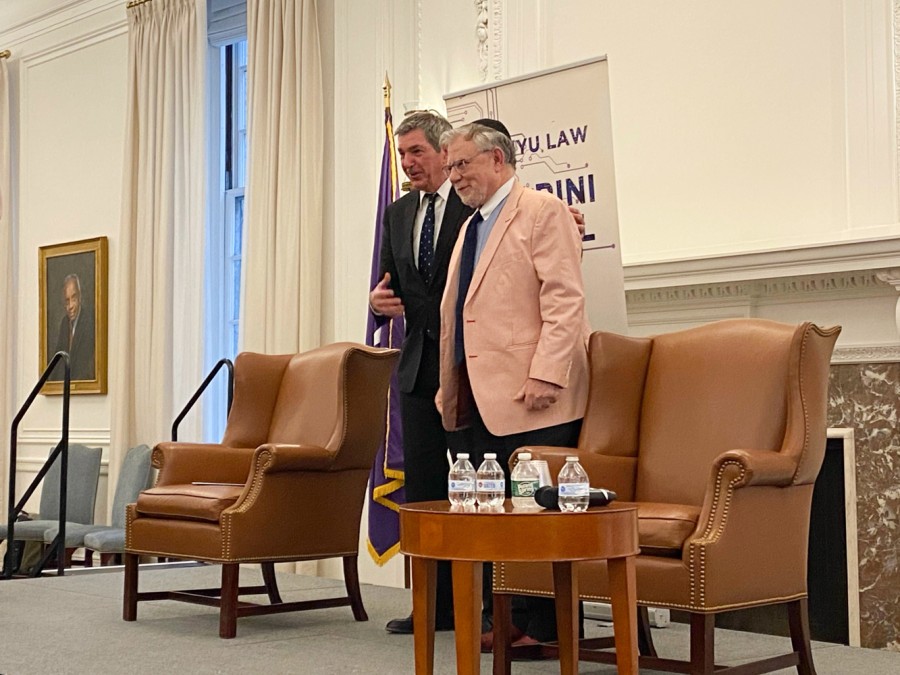EU ambassador talks AI at NYU Law event
The ambassador to the United States visited NYU’s School of Law to speak about the future of AI regulation and government surveillance.
Ambassador of the European Union to the United States, Stavros Lambrinidis (left), and NYU Law professor J.H.H. Weiler (right). (Alina Hollister for WSN)
April 27, 2023
Stavros Lambrinidis, the European Union’s ambassador to the United States, warned an audience of students and faculty of the potential dangers to human rights posed by artificial intelligence and surveillance technology in the global sphere at an NYU School of Law event Monday.
Lambrinidis’ address to the audience was followed by a fireside chat between him and Joseph Weiler, the co-director of the law school’s Jean Monnet Center for International and Regional Economic Law & Justice, which has a focus on international economic policy and EU law.
At the talk, Lambrinidis said that it is vital for there to be an agreement between different countries on basic principles for technology use. He also said that despite there being many prominent tech corporations in the United States, there is a lack of government oversight of the technologies they create.
“It should not be the mere creation of technology or technological breakthrough that should determine which technology is used,” Lambrinidis said. “It should be citizens, governments, civil society and the private sector making that determination after a serious discussion.”
The event was hosted by the center, NYU Law’s European Legal Society and Guarini Global Law & Tech — a part of the law school’s Guarini Institute for Global Legal Studies. The talk was part of a larger conference on transatlantic regulation of AI at the law school also organized by Global Law & Tech.
Una Draganic, a law student at the event, said that the United States should model its data privacy policies after the General Data Protection Regulation, the EU’s regulation on data protection, saying that California already has similar regulations in place. Draganic also disagreed with a recent congressional bill called the RESTRICT Act that would allow the government to limit and even ban technologies from six countries considered U.S. adversaries, including China. If passed, the act could lead to a ban of the Chinese-owned social media app TikTok.
“The accent should not be on national security threats, as with the TikTok debate — which I think is just nonsense — but to maintain focus on more important things,” Draganic said.
Lambrinidis also spoke about the potential danger posed by biases in AI, 24-hour surveillance and social scoring of citizens — the last of which is used in China, and added that the EU aims to protect citizens’ freedom, hope and values in its approach to technological innovation.
He also weighed the possibility of newer technologies contributing to a surveillance state, saying that widespread government surveillance is more likely to come little by little, rather than in one fell swoop.
“‘So hey, do you want to catch terrorists? Why don’t you allow me to just survey you 24 hours a day — if you have nothing to hide, you have nothing to fear,’” Lambrinidis said. “I would answer that if you have nothing to hide, you don’t have a life.”
Barbara Metallinou, another student at the law school who attended the event, said she thinks powerful countries need to make greater efforts to protect citizens’ digital privacy. The increasing presence of technology and that regulation in the field requires international collaboration, she said.
“Given the extent of the intrusion of technology nowadays in our lives, countries like the United States, big countries with lots of power worldwide, should be an example and try to regulate and be protective toward people and human rights and privacy,” Metallinou said.
Contact Alina Hollister at [email protected].
























































































































































